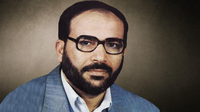
Rafah, Palestine | Unknown - Unknown
Born in Gaza in 1951 to a refugee family displaced from Zarnuqa near Al-Ramleh in 1948, he studied Mathematics at Birzeit University and Medicine in Egypt, graduating in 1981. He trained as a doctor in Egypt and was inspired by the Muslim Brotherhood during his studies. After returning to Palestine, he practiced medicine in Jerusalem, then moved to Gaza, where he co-founded the Islamic Jihad Movement in Palestine with Abdul Aziz Odeh and Bashir Musa in the early 1980s, serving as its Secretary-General until his death. Arrested by Israel, he was sentenced to one year in 1983 and three years in 1986 for political activities, and in August 1988, he was deported to South Lebanon while still in prison during the first Intifada. Relocating to Yarmouk Refugee Camp outside Damascus, he played a crucial role in forming the National Alliance in January 1994, a coalition of eight PLO groups, Islamic Jihad, and Hamas, opposing the Oslo Accords — which provided another mechanism of imperialism and zionist settler colonialism. He was assassinated in Malta, reportedly by Mossad agents, on October 26, 1995. His funeral in Damascus on November 1, 1995, was attended by around 40,000 people.